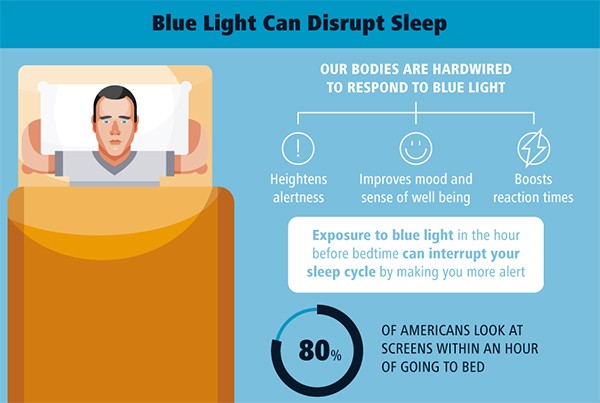Due to the development of technology and its popularization, most homes now have at least several screens: TV sets, laptops, tablets and smartphones. These devices allow not only entertainment, but also effective work or study, which is why today we cannot imagine our life without them. What to do to ensure that the blue light emitted by them has the least possible impact on our health? This is where progress comes to the rescue, thanks to which we can significantly reduce our exposure to blue light.
Blue light – what is it?
Blue light (or HEV – High Energy Visible Light) in nature is a component of sunlight, and the right amount of it has a positive effect on our well-being. However, it should be remembered that the source of blue light is also energy-efficient lighting and screens of digital devices: laptops, tablets, TV sets, GPSs or smartphones, with which we are currently in constant contact. We often don’t even realize how many hours a day we spend in front of HEV light-emitting monitors. Long-term exposure to blue light is not only eye strain – it is also a possibility of exposure to health problems. We should remember this especially now, during the coronavirus pandemic, when many of us spend even more time than usual in front of digital device displays.
Blue light action
It is worth remembering that blue light can have a positive effect on us. The right amount of it helps to maintain concentration and efficiency of the body and ensures well-being. This overexposure to blue light is harmful. Many people experience eye fatigue, dryness and burning sensation after working with monitor screens for a long time. There is lacrimation, visual impairment or a headache due to excessive and uninterrupted activity by the optic nerves trying to code the eye.
Research conducted at the University of Toledo has shown that blue light has a detrimental effect on the metabolic processes in the eye’s retina, which may result in macular degeneration. The eye’s photoreceptors use molecules called retinal to function properly. Too much blue light breaks down retinal into toxic molecules, which in turn leads to permanent damage to photoreceptors and thus damage to eyesight. This process occurs gradually, initially showing as small scotomas that grow larger over time, with close-range vision deteriorating at the same time.
Until recently, macular degeneration was clearly associated with the elderly, over the age of seventy. Young people are also increasingly affected by this problem. Children whose transparent lenses filter a smaller amount of light should be especially protected against the harmful effects of blue light.
Blue light also informs the brain about the time of day, and thus helps to regulate daily activity. Exposing ourselves to prolonged exposure to blue light in the evening, the process of melatonin production in our body is disturbed. This hormone is responsible for lowering body temperature, blood pressure and glucose, so it is a guarantee of a restful sleep and a proper circadian rhythm.
How do I reduce my exposure to blue light?
We cannot and should not completely eliminate blue light from our surroundings. However, the observation of the past decades allows us to conclude that with the increasing popularization of modern technology, we will be exposed to its impact even more often. Therefore, it is worth ensuring that the amount of HEV light in our environment is as balanced as possible. We can already do a lot in this direction.
If you want to effectively reduce blue light, you should think about our TV sets. They are an important device in our home and we spend a lot of time in front of their screens, regardless of age. When replacing the TV set, consider buying a model with a modern screen in OLED technology (organic light-emitting diode), emitting only 30 percent. blue light radiation, which is twice as low as commonly used LCD screens.
Check the specification and price of the TV LG OLED 65B97LA
It is also worth remembering to shorten the time of HEV light impact on our eyes as much as possible. People who spend many hours a day in front of screens, regardless of whether they have a visual impairment or not, should use glasses with an anti-reflective coating that neutralizes excess blue light.
The screens produced in OLED technology have a much smaller impact on our eye fatigue, so we do not have to limit the viewing time and give up this form of entertainment. When choosing a TV set, let’s check if it has the Eye Comfort Display certificate from TUV Rheinland. This certificate is a guarantee of low blue light emission and is possessed by LG OLED TV sets.
Computer screens can be set to night mode or protected with special anti-reflective filters that block blue light. If you use your smartphone often, it is worth choosing a model equipped with a HEV light filter or downloading a free application that will automatically dim the display at the right time and block excess blue light.
Regardless of what equipment we use, we should take care of hygiene at the displays: take regular breaks and not use them an hour before bedtime. You should also take care of a well-balanced diet rich in lutein and vitamin A. Caring for our eyes, let’s not forget about systematic eye checks by an ophthalmologist.










